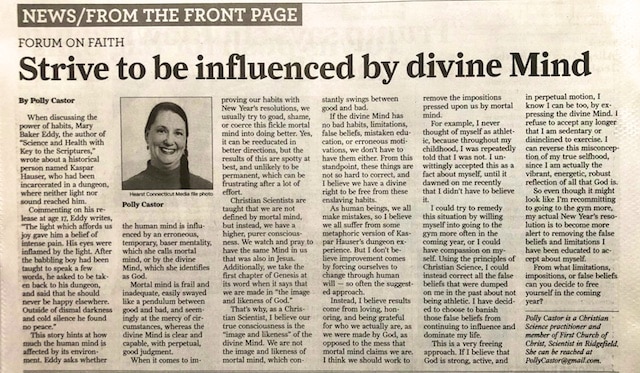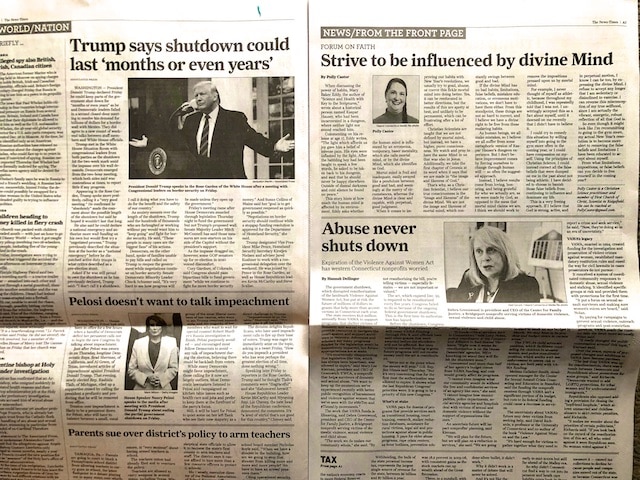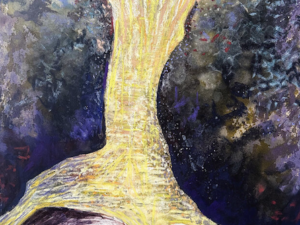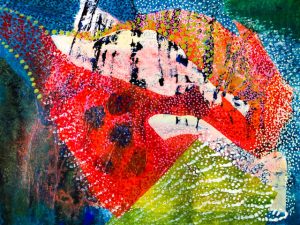
–
I am a regular, periodic writer for the Forum on Faith column in three Connecticut newspapers: the Danbury News-Times, the Stamford Advocate, and the Connecticut Post. This one got very good placement as you can see in the photo below, just behind the front page news. They choose the title, which can sometimes be dicey, but I thought they nailed it this time. You can read the column I wrote here:
Strive to Be Influenced by Divine Mind
When discussing the power of habits, Mary Baker Eddy, the author of Science and Health with Key to the Scriptures, wrote about a historical person named Kaspar Hauser, who had been incarcerated in a dungeon, where neither light nor sound reached him.
In commenting on his release at the age of seventeen, she writes, “The light which affords us joy gave him a belief of intense pain. His eyes were inflamed by the light. After the babbling boy had been taught to speak a few words, he asked to be taken back to his dungeon, and said that he should never be happy elsewhere. Outside of dismal darkness and cold silence he found no peace. Every sound convulsed him with anguish. All that he ate, except his black crust, produced violent retchings. All that gives pleasure to our educated senses gave him pain through those very senses, trained in an opposite direction.”
This story hints at how much the human mind is affected by its environment. Eddy asks whether the human mind is influenced by an erroneous, temporary, baser mentality, which she calls mortal mind, or by the divine Mind, which she identifies as God. Mortal mind is frail and inadequate, easily swayed like a pendulum between good and bad, and seemingly at the mercy of circumstances, whereas the divine Mind is clear and capable, with perpetual, good judgement.
When it comes to improving our habits with New Year’s resolutions, we usually try to goad, shame, or coerce this fickle mortal mind into doing better. Yes, it can be reeducated in better directions, but the results of this are spotty at best, and unlikely to be permanent, which can be frustrating after a lot of effort.
Christian Scientists learn that we are not defined by mortal mind, but instead, we have a higher, purer consciousness. We watch and pray to have the same Mind in us that was also in Jesus. Additionally, we take the first chapter of Genesis at its word when it says that we are made in “the image and likeness of God.”
That’s why Christian Scientists believe our true consciousness is the “image and likeness” of the divine Mind. We are not the image and likeness of mortal mind, which constantly swings between good and bad.
Since the divine Mind has no bad habits, limitations, false beliefs, mistaken education, or erroneous motivations, we don’t have to either. From this standpoint, these things are not so hard to correct, and we have a divine right to be free from these enslaving habits.
Humanly, we all make mistakes and suffer from some metaphoric version of Kaspar Hauser’s dungeon. However, Christian Scientists believe that improvement doesn’t come by forcing ourselves to change through human will, which is so often the suggested approach. Instead, results come from loving, honoring, and being grateful for who we actually are, as made by God, as opposed to the mess that mortal mind claims we are.
In fact, we work to remove the impositions pressed upon us by mortal mind. For example, I never thought of myself as athletic, because throughout my childhood, I was repeatedly told that I was not. I unwittingly accepted this as a fact about myself, until it dawned on me recently that I didn’t have to believe it.
I could try to remedy this situation by willing myself into going to the gym more often in the coming year, or I could have compassion on myself and correct all the false beliefs that were inadvertently dumped on me in the past about not being athletic. I have decided to proactively choose to banish those false beliefs from continuing to influence and dominate my life. Since God is strong, active, and in perpetual motion, I can be too, by expressing the divine Mind.
This is a very freeing approach. So even though it might look like I’m recommitting to going to the gym more, my actual New Year’s resolution is to become more alert to removing the false beliefs and limitations I have been educated to accept about myself. I refuse to accept any longer that I am sedentary or disinclined to exercise. I can reverse this misconception of my true selfhood, since I am actually the vibrant, energetic, robust reflection of all that God is.
What limitations, impositions, or false beliefs can you decide to free yourself from in the coming year?
Polly Castor is a Christian Science Practitioner who is a member of First Church of Christ, Scientist, in Ridgefield, Connecticut. She be reached at PollyCastor@gmail.com
–

8 Comments
-
Thanks for sharing! And well done for getting into print in a local paper.
-
Perfect!
-
Excellent
-
I love this, too! Really beautifully explained. I’ll be sharing this with friends. (Polly, I read so many of your posts and enjoy them all! I just don’t take time to leave a reply!)
-
Author
Great to hear from you!
-
-
Excellent!
-
Thankful for this perspective, Polly. I was recently provoked to respond in an unkind , angry way to a deep injustice inflicted on me , and now carry a real burden of sorrow and guilt and inability to clearly apologize for my response to that hurt. Through reading your thoughts about Divine Mind I feel I might be able to suck up the hurt that caused my reaction and allow myself forgiveness to get over it, to the extent i could make a decent and heartfelt apology, and not wait for or hope for anything similar from the one who caused me the hurt in return. A dear longtime friend suddenly and without rational reason just tossed me away … said Goodbye…for the second time! Obviously he was angry at me, but I had no knowledge as to why his behaviour was SO furious and vengeful. So it provoked me to act in like manner! Now I regret my reaction… and realize his fury was not rational or justified, but came from some deep seated , long ago hurt , probably in early childhood, which I had somehow re-opened in him. I’d like to make amends, knowing full well it’s most unlikely my apology will be accepted or change anything. So thank you again…I will apologize and leave it there !
-
Author
Forgiveness always is worth it. You might want to read my husband’s blog last week about forgiveness: http://thebiblespeakstoyou.com/the-healing-power-of-forgiveness/?utm_source=feedburner&utm_medium=feed&utm_campaign=Feed%3A+TheBibleSpeaksToYou+%28The+Bible+Speaks+to+You%29
-






